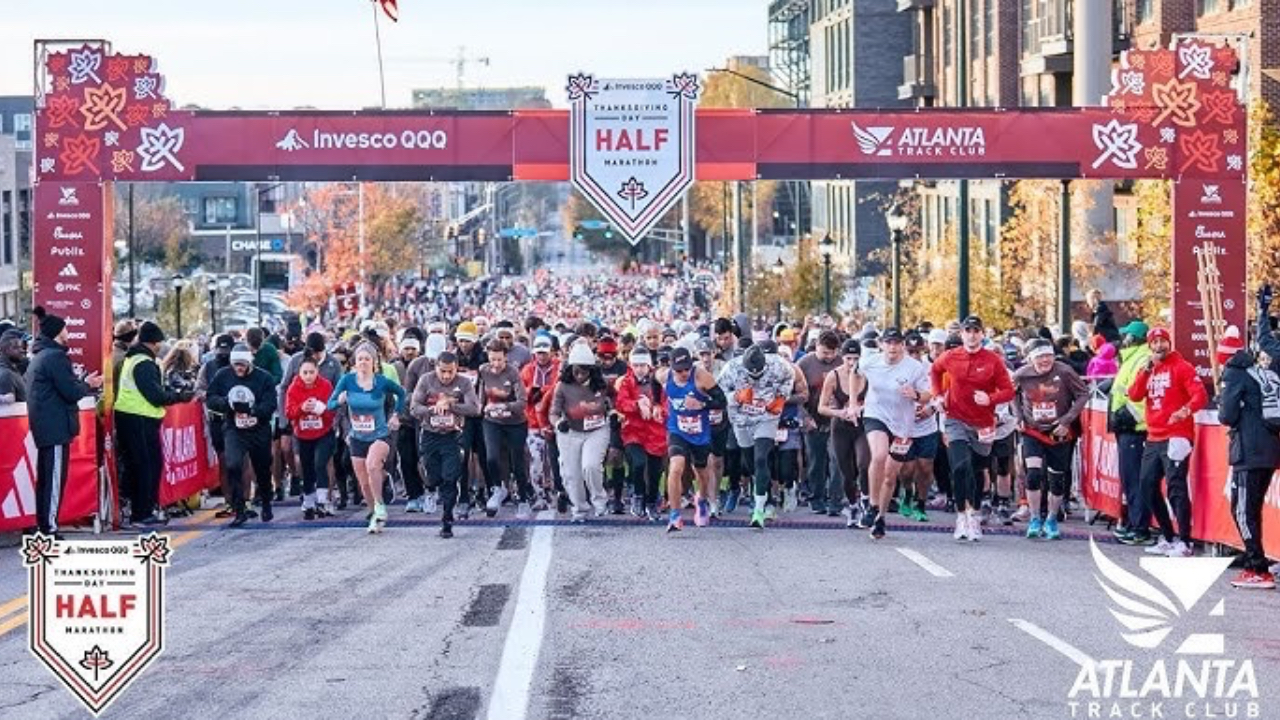How to Prep for the Atlanta Thanksgiving Half Marathon: A Physical Therapist’s Guide
Oct 14, 2025
Whether it’s your first or tenth Atlanta Half Marathon, the key to enjoying race day is wise planning leading up to the race! From smart and thoughtful mileage progression to dialing in nutrition, here’s how to get your body and mind ready to run strong in Atlanta this Thanksgiving.
1. Build Volume Gradually
Oftentimes I see runners get injured by doing too many miles too soon or running too fast without a proper build up. I see clients have the most success with consistent, sustainable increases in mileage, letting your body adapt to the stress of training.
- The 10% rule: Given enough build time, I try to limit increasing total weekly mileage volume to ~10% per week. This can be altered at really low mileage.
- The 33% Rule: I usually prefer the longest run of the week by less than 33% of your total weekly mileage. I frequently see soft tissue or bone stress injuries with overloading the longest run of the week.
- Prioritize long runs: I generally recommend getting up to at least a 10-mile long run two weeks prior to race day.
- Cross-train: If you are new to running, I love cross training on the bike to allow for continued cardiovascular gains with less pounding on the feet that comes from running. Generally I recommend hopping on the bike trainer for twice the volume of your average run distance.
- If you average seven miles per run, try cycling for 14 miles.
2. Layer in Speed Work
If you have a consistent running base, you can add structured speed work to help improve leg turnover and pacing. I typically emphasize learning paces for beginners, as a common fault during races is starting off too fast and fatiguing towards the end of the race.
- Start with strides after your runs: I like to perform strides for 10-20 seconds to help with getting the nervous system feeling better and smooth at faster speeds. I usually recommend working up from 50% to 90% speed at the end of your easy runs. .
- Add tempo runs: Tempo runs are one of my favorite ways to work on getting your ideal race pace locked in. You can perform progressive runs where you work your way down to quicker paces during the run.
- Include hill workouts: Atlanta is a hilly course and would greatly benefit from hill repeat workouts a few times prior to the race.
- Perform a proper warm up: Make sure your body is prepped for quicker paces with a proper warm up. I like to emphasize on getting the hips loose, and some light plyometrics to get the tendons ready for faster running.
3. Dial in Race Day Nutrition
You can train perfectly, but if you mismanage fueling or hydration, race day can fall apart fast. Practicing your nutrition strategy in training helps you discover what works best for your body.
- Practice your race-day breakfast: Prior to long runs, eat your race day breakfast to make sure your stomach is agreeable to your choice of food. I usually eat breakfast two hours prior to the start of the race.
- Hydrate daily: Make sure you are well hydrated during all of your runs. It’s cooling down in Atlanta leading up to the race, and this is when people usually slip up on getting enough fluids in their system.
- Race Nutrition: I typically aim for 60-90 grams of carbs per hour using gels, chews, or sports drinks. I usually recommend consuming carbs around the 5k or 30-minute mark (whichever comes first).
- Find the best Supplement: Everyone is different but I recommend trying to find supplements that provide a blend of glucose, fructose, or sucrose as they are absorbed at different rates and can provide better carb absorption during your race.
- Avoid new foods or supplements on race day: Stick with what your body knows.
4. Taper and Trust
The final phase of training is about sharpening your race day pace and readiness. If you have not put in the work and volume pre-race, you are not going to make up your training volume in the last few weeks. During the taper weeks for a half marathon, I tend to focus on dialing in the race pace; you want to arrive at the start line on Thanksgiving day fresh and strong.
- Cut total mileage: I generally cut mileage around 25-30%
- Keep Up the Intensity: If you are able to build up to performing workouts, try and keep the intensity and pace up leading into the race.
- Sleep well: Make sure to always get good sleep, but especially leading up to Thanksgiving day.
- Trust your Work: Trust you have put in the proper mileage and work leading up to race day.
Overall Points: Be consistent in your volume progression, be smart with your nutrition and hydration, get good sleep and recovery between runs, and work on pacing during training runs. Train smart, fuel wisely, and you’ll cross the finish line strong and be ready for that post-race Thanksgiving feast.
Thanks for reading,
Dr. Sam, PT, DPT, OCS
Let us help you figure out to live your best active life today!
Remember, Movement is Medicine!

